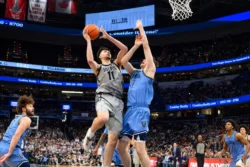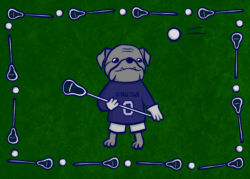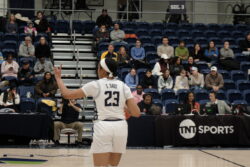Georgetown’s star sophomore Greg Monroe seemed to have a case of the Mondays this week.
“Monday is the worst day of the week. Everyday is the same and so r u….idk lol,” Monroe told his nearly 400 Twitter followers around 9 a.m. this past Monday morning.
An hour or so later, Monroe—also known as “moosejuice10” on Twitter—was in better spirits. “Learning about eudaimonia—(good living) kinds fascinating,” he tweeted.
In addition to musings on academics (“Criminal justice….idk what to say about this class….professor is hilarious.he look like the dad from Malcom in the middle!”) and conversations with teammate Austin Freeman (known in the twitterverse as “IAMFREE15”), Monroe will occasionally give candid commentary on Georgetown basketball.
“up early tweeps! finally get to play someone else. i love my teammates but damn I was tired of them!” he wrote on Saturday before the team scrimmaged against George Mason. The game took place behind closed doors, which normally would mean that the general public would never know what happened. But by Saturday afternoon, Freeman had tellingly tweeted, “Swagged on them,” and the next day George Mason guard Isaiah Tate revealed on Twitter that the Hoyas won by one.
With the growth of social media sites like Facebook and Twitter, college players’ thoughts are becoming more and more public, giving fans the kind of direct access that was previously impossible.
“[It allows fans to] interact directly with the team as opposed to through a third-party,” said Ankit Bishnoi (MSB ’06), who co-manages the Georgetown basketball blog Casual Hoya.
While Monroe and Freeman are the only current men’s basketball players with public Twitter accounts, almost every member of the team has a Facebook account. Between them, the men’s team has over 17,000 Facebook friends, and four of the players’ profiles are open to members of the Georgetown network.
Athletes’ increased exposure has the clear potential to make news—good and bad—that schools can’t control. This August, frequent tweeter DaJuan Summers, who left Georgetown last year to join the NBA, made headlines for entering into a contest with porn star Valerie Luxe to see who could get to 4,000 followers first.
“I think it’s a fine line to walk,” Jacob Rosen, Director of New Media for the consulting firm Sports Media Challenge, said. “You want to be able to use the personalities of the players and coaches as an asset, but, from the Athletic Department’s perspective, you also want to protect against negative [press].”
While some schools have enacted rules or prohibitions on student-athletes’ use of social networking sites, Georgetown does not have an official policy, according to Sports Information Director Mike Carey. Athletic Department employees and coaches do caution them to think carefully before posting publicly, though.
“We act just like an advisor would,” Carey said. “We tell them, ‘If you are doing things with social media, be smart. Think about what you’re doing before you act’ … But I don’t think we have to worry about that too much at Georgetown because we have a real good group of kids.”
Carey said that Georgetown’s Athletic Department doesn’t have a specific policy regarding teams using social media, either. If teams, booster organizations or coaches want to set up social media sites, the Athletic Department will work with them, but it’s ultimately up to the individuals.
The Athletic Department itself has seized the moment of emerging public relations techniques, integrating “Hoya Insider” videos into its main website, and recently starting a blog where student-athletes and athletic department employees discuss their day-to-day activities. The department also has started a Twitter account, though it is used mostly as a direct feed for press releases posted on the main website.
Rosen said his firm encourages schools not to prohibit players’ access to social media sites, but to make sure they lay out written guidelines for student-athletes and coaches.
“In an ideal world, you wouldn’t restrict anyone, but you would provide them with certain guidelines on the types of things they can talk about,” Rosen said. “Social media is supposed to be social, it has to be human and personable, and you don’t want to take that away.”






Over at HoyaHoops.com, we just compiled a few lists of Georgetown Basketball related twitterers out there that you can follow all at once. Check it out: http://hoyahoops.com/2009/11/04/tweet-rocks/